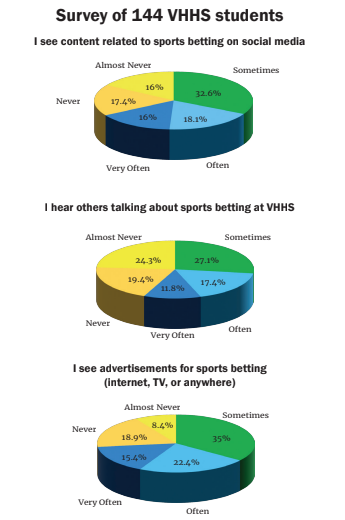
The author has chosen to keep sources anonymous in this article to safeguard privacy and encourage open dialogue without fear of punishment.
As a student scrolls through TikTok, a colorfulvideo splashes onto the screen. The neon yellowcaption shouts “TOP 5 NFL PICKS THIS FRIDAY!” They quickly save the video and switch apps.“PrizePicks, here I come, because I’m a degenerate,”they said.
In the past, sports betting was an activity that a student had to go out of their way to participate in, working through shady illegal bookies or logging into websites hosted in other states, with a risk of getting in big trouble.
However, the legalization of sports betting in Illinois and the rise of online sportsbooks has made it much simpler for students to get their illegal betting fix, and increased exposure through new social media platforms such as TikTok has led to more eyes on this illicit pastime.
Student 1, who has chosen to remain anonymous, said that most people they know that gamble started because of exposure to social media content and internet ads.
“It’s on my TikTok For You Page, Instagram reels, everywhere,” they said.
In a survey of the VHHS student population, 33% of respondents said that they often or very often see content related to sports betting on their social media, even though most large platforms claim that they restrict access to gambling-related content.
According to TikTok’s Terms of Service, the app does “not allow the promotion of gambling services,” with the document expressly banning “betting tips, gambling-related software, and apps.”
However, the hashtags #BettingTips and #SportsBettingTiktok have 502 million views and 3.1 billion views respectively. On Instagram, sports gambling accounts also have follower counts reaching into the millions, but are restricted to users over the age of 18, still under the legal age to gamble.
Another way sports betting has spread around the school is through simple word-of-mouth.
“When someone wins a lot of money, they really like to tell everyone how smart they are. Losers stay quiet,” said Student 1.
In a survey of the student population, 29.4% of respondents said they often or very often hear others talking about sports gambling.
Student 2, who also chose to remain anonymous, said that they and their friends often discuss what players and teams they want to bet on, as well as which platforms have the best picks for each game.
“[Your chance of winning] depends on the site you choose. A lot of us have accounts on multiple different ones,” they said.
Most of these betting websites are officially sanctioned by the Illinois Gambling Board. However, students at VHHS have been able to access them and illegally place bets, even while on school grounds.
A recent amendment to the Sports Betting Act made it much easier to access sportsbooks online. Until March of 2022, betters were required to register in person at casinos before they could start betting online, and all online gambling websites were required to be connected to a physical casino in Illinois.
That all changed when the Illinois state legislature passed H.B. 3136, which lifted the in-person restriction and opened the floodgates for much larger online-only sportsbooks to enter the market, although according to the Legal Sports Report, online-only companies have to pay a 20 million dollar fee.
Student 3 does not gamble, but still chose to remain anonymous. They said the protections betting sites use are not good enough to prevent others from gambling.
“I tried to log in with my social security number to see what would happen. It didn’t work, but you can just use your parent’s,” said Student 3.
While Student 3 wasn’t able to log in, other students have no problem accessing legal betting websites.
“Some of them don’t even ask for the social security number. I just have to put my parent’s name, and I’m in. All they ask for is name and date of birth, and then I can start gambling,” said Student 1.
Student 2 said they use their dad’s ID and are signed in to multiplemobile apps.
While some students view sports gambling as harmless, an act of rebellion, or a way to make money, young people are actually most susceptible to gambling addiction, with the International Centre For Youth Gambling Problems finding evidence indicating that 4–8% of adolescents between the ages of 12 and 17 have a very serious gambling problem, with another 10–15% at-risk for developing a gambling problem.
Amy Dillon is the prevention and wellness coordinator at VHHS and has years of experience dealing with addiction in
adolescents.
“[Sports betting] is impacting your brain, and you’re setting yourself up for a lifetime of having an addictive personality,” Dillon said.
Gambling at a young age can cause serious problems, even far in the future. The Massachusetts Department of Health found that adolescent gamblers are four times as likely to develop a gambling addiction later in life.
“The people in the gambling world are very strategic. They know what they’re doing. You get awards, they give you a little reward, or they give you a free bet to keep you coming back and to keep you excited. And so that all has adrenaline rushes, it has dopamine releases in your brain, and that just feeds the addictive brain. And in underdeveloped brains anyways, you’re already more susceptible to becoming addicted to whatever the substance is,” Dillon said.
Looking for help may seem scary due to the risk of punishment or adult intervention. However, according to Dillon, resources are available at VHHS for students struggling with gambling addiction, including social workers, counselors, and addiction groups.
While social media and online sportsbooks have changed the industry in a variety of ways, two things remain constant: underage gambling is illegal and help is always out there.
